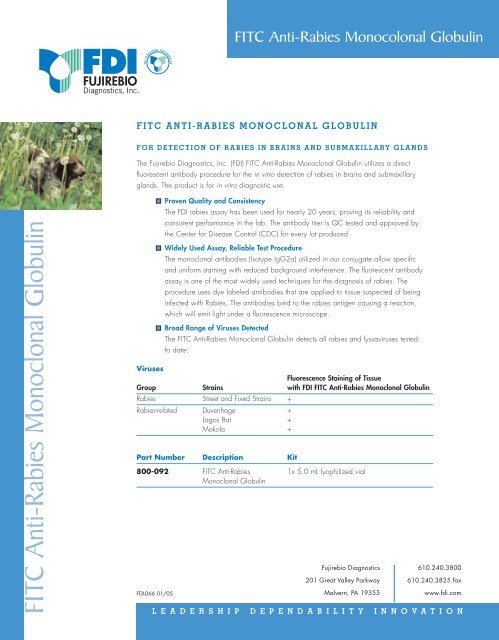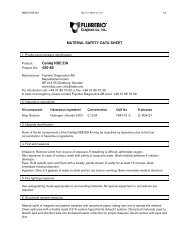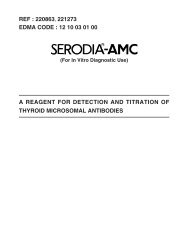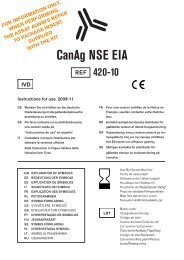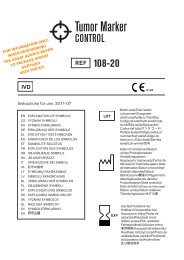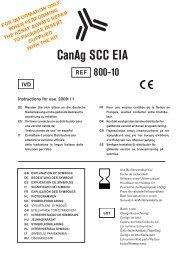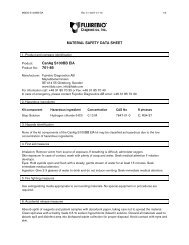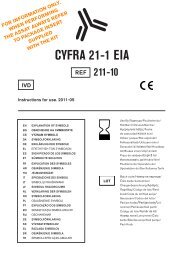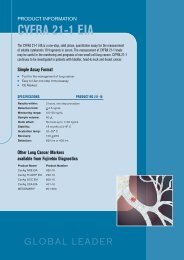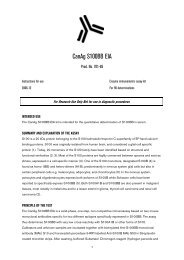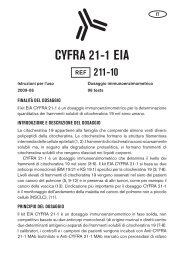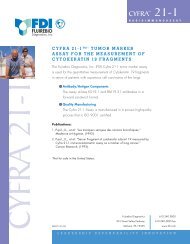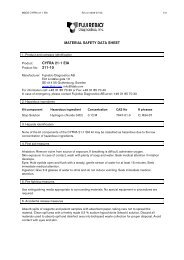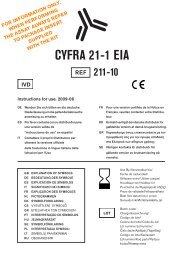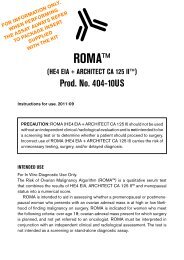FITC Anti-Rabies Monoclonal Globulin - Fujirebio Diagnostics, Inc.
FITC Anti-Rabies Monoclonal Globulin - Fujirebio Diagnostics, Inc.
FITC Anti-Rabies Monoclonal Globulin - Fujirebio Diagnostics, Inc.
You also want an ePaper? Increase the reach of your titles
YUMPU automatically turns print PDFs into web optimized ePapers that Google loves.
IFDIFUJIREBIO<strong>Diagnostics</strong>, <strong>Inc</strong>.O RF DI GI N A LA N TI B O DI E S<strong>FITC</strong> <strong>Anti</strong>-<strong>Rabies</strong> Monocolonal <strong>Globulin</strong><strong>FITC</strong> ANTI-RABIES MONOCLONAL GLOBULINFOR DETECTION OF RABIES IN BRAINS AND SUBMAXILLARY GLANDSThe <strong>Fujirebio</strong> <strong>Diagnostics</strong>, <strong>Inc</strong>. (FDI) <strong>FITC</strong> <strong>Anti</strong>-<strong>Rabies</strong> <strong>Monoclonal</strong> <strong>Globulin</strong> utilizes a directfluorescent antibody procedure for the in vitro detection of rabies in brains and submaxillaryglands. The product is for in vitro diagnostic use.<strong>FITC</strong> <strong>Anti</strong>-<strong>Rabies</strong> <strong>Monoclonal</strong> <strong>Globulin</strong>FDI-066 01/05Proven Quality and ConsistencyThe FDI rabies assay has been used for nearly 20 years, proving its reliability andconsistent performance in the lab. The antibody titer is QC tested and approved bythe Center for Disease Control (CDC) for every lot produced.Widely Used Assay, Reliable Test ProcedureThe monoclonal antibodies (Isotype IgG2a) utilized in our conjugate allow specificand uniform staining with reduced background interference. The fluorescent antibodyassay is one of the most widely used techniques for the diagnosis of rabies. Theprocedure uses dye labeled antibodies that are applied to tissue suspected of beinginfected with <strong>Rabies</strong>. The antibodies bind to the rabies antigen causing a reaction,which will emit light under a fluorescence microscope.Broad Range of Viruses DetectedThe <strong>FITC</strong> <strong>Anti</strong>-<strong>Rabies</strong> <strong>Monoclonal</strong> <strong>Globulin</strong> detects all rabies and lyssaviruses testedto date:VirusesFluorescence Staining of TissueGroup Strains with FDI <strong>FITC</strong> <strong>Anti</strong>-<strong>Rabies</strong> <strong>Monoclonal</strong> <strong>Globulin</strong><strong>Rabies</strong> Street and Fixed Strains +<strong>Rabies</strong>-related Duvenhage +Lagos Bat +Mokola +Part Number Description Kit800-092 <strong>FITC</strong> <strong>Anti</strong>-<strong>Rabies</strong> 1x 5.0 mL lyophilized vial<strong>Monoclonal</strong> <strong>Globulin</strong><strong>Fujirebio</strong> <strong>Diagnostics</strong>201 Great Valley ParkwayMalvern, PA 19355610.240.3800610.240.3825 faxwww.fdi.comL E A D E R S H I P D E P E N D A B I L I T Y I N N O V A T I O N
References:1. The World Health Organization, 1966. Laboratory Techniques in <strong>Rabies</strong>, Monograph SeriesNo. 23, Second edition.2. The World Health Organization, 1966. WHO Expert Committee on <strong>Rabies</strong>. Technical ReportSeries No. 312 Fifth edition.3. McQueen, J.L., Lewis, A.L., and Schneldei, N.J., 1960. <strong>Rabies</strong> Diagnosis by Fluorescent<strong>Anti</strong>body. Its Evaluation in a Public Health Laboratory. Amer J. Publ. Hlth. 50:1743–1752.4. Wiktor, T.J., and Koprowski, H. 1978. <strong>Monoclonal</strong> <strong>Anti</strong>bodies Against <strong>Rabies</strong> VirusProduced by Somatic Cell Hybridization: Detection of <strong>Anti</strong>genic Variants. Proc. Natl. Acad. Sci.,U.S.A. 75:39385. Wiktor, T.J., Flamand, A., and Koprowski, H. 1980. Use of <strong>Monoclonal</strong> <strong>Anti</strong>bodies In Diagnosisof <strong>Rabies</strong> Virus Infection and Differentiating of <strong>Rabies</strong> and <strong>Rabies</strong>-Related Viruses.J. Virol. Methods. 1:1–10.6. Letter on file at Centocor from George M. Baer, D.V.M., Centers for Disease Control,Lawrenceville Facility. April 20, 1987.Additional Information:U.S. Centers for Disease Controland PreventionMail Stop A-261600 Clifton Rd., NEAtlanta, GA 303331.888.232.3228www.cdc.gov/ncidod/dvrd/rabies/World Health OrganizationAvenue Appia 201211 Geneva 27Switzerland(+00 41 22) 791 21 11www.who.intU.S. Food and Drug Administration5600 Fishers LanceRockville, MD 208571.800.532.4440www.fda.govWHO Collaborating Centrefor <strong>Rabies</strong> Sureveillance & Researchat the Federal Research Centrefor Virus Disease of AnimalsPostfach (P.O. Box) 1149D-72001 TubingenFederal Republic of Germany+49 7071 967-210www.who-rabies-bulletin.orgNote: FDI is not responsible for the content or accuracy of information on these websites.FUJIREBIO DIAGNOSTICS SETS THE STANDARD FOR EXCELLENCEFor over 20 years, <strong>Fujirebio</strong> <strong>Diagnostics</strong>, <strong>Inc</strong>. (FDI) has been the trusted source of innovativesolutions in oncology diagnostics. At the heart of FDI’s products are the original Centocorantibodies, forming the base of a product line long recognized around the globe for leadershipand dependability. FDI’s extensive menu of diagnostic products set the standard for excellence:Supported by thousands of peer-reviewed articlesEndorsed by prestigious academic institutions and medical centersProven manufacturing process and ISO 9001 certified quality systemDistributed worldwide by leading healthcare organizationsFor more information, call +1.610.240.3800 or visit www.fdi.com<strong>Fujirebio</strong> <strong>Diagnostics</strong>201 Great Valley ParkwayMalvern, PA 19355610.240.3800610.240.3825 faxwww.fdi.comL E A D E R S H I P D E P E N D A B I L I T Y I N N O V A T I O N


